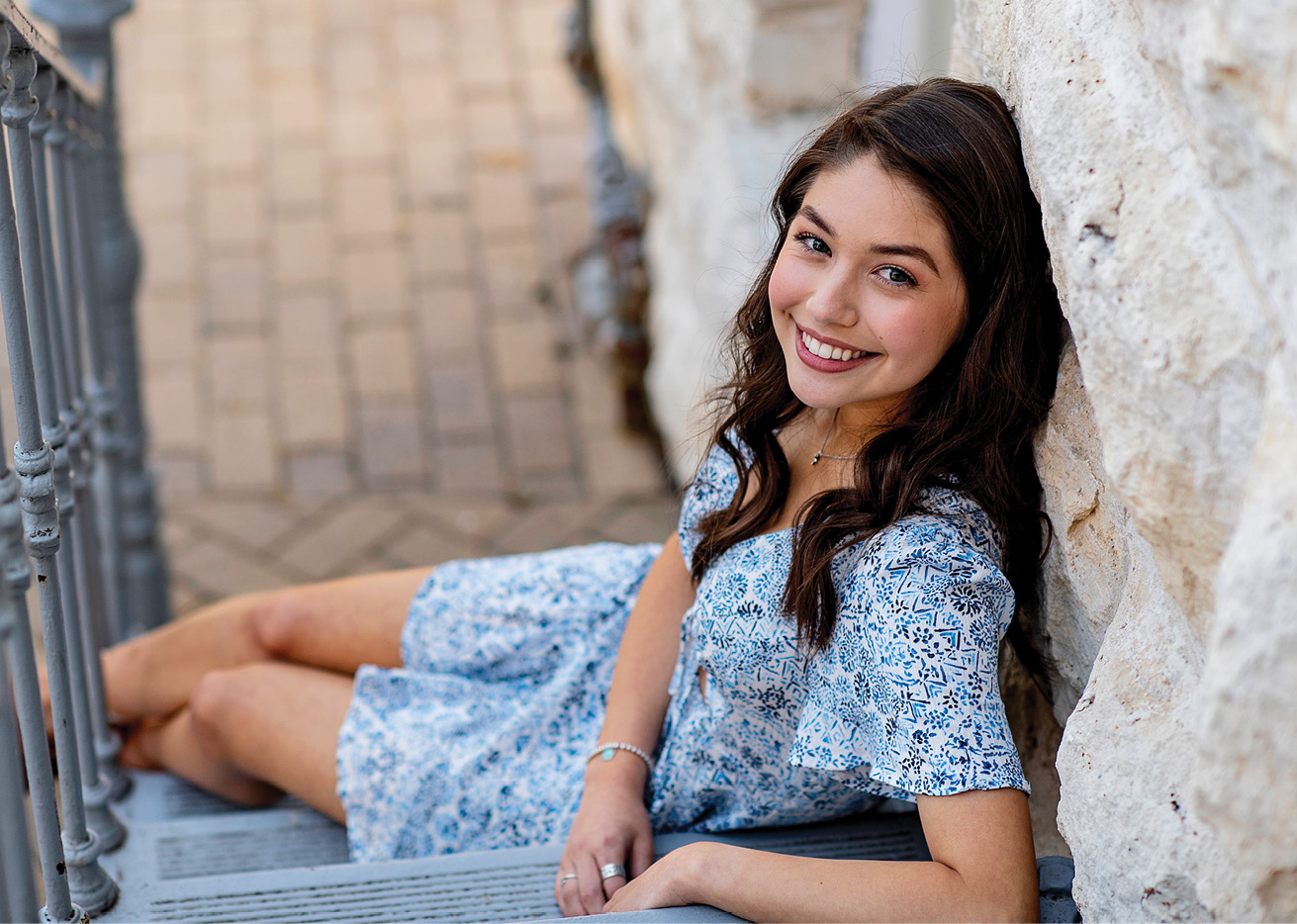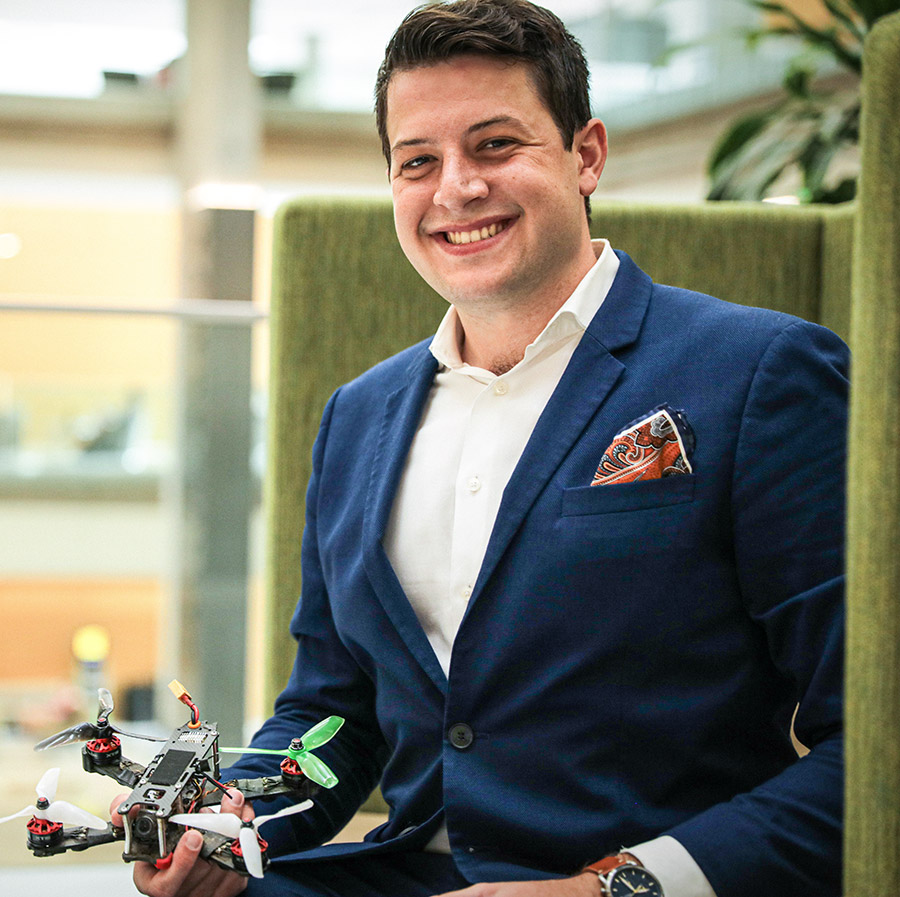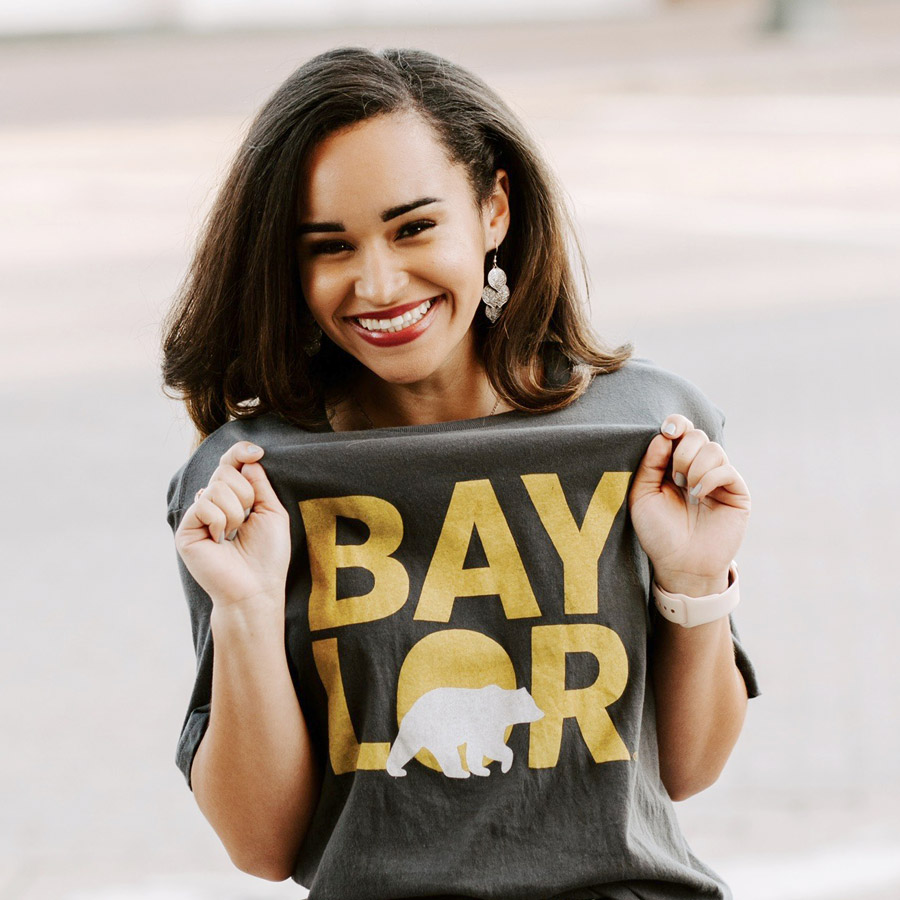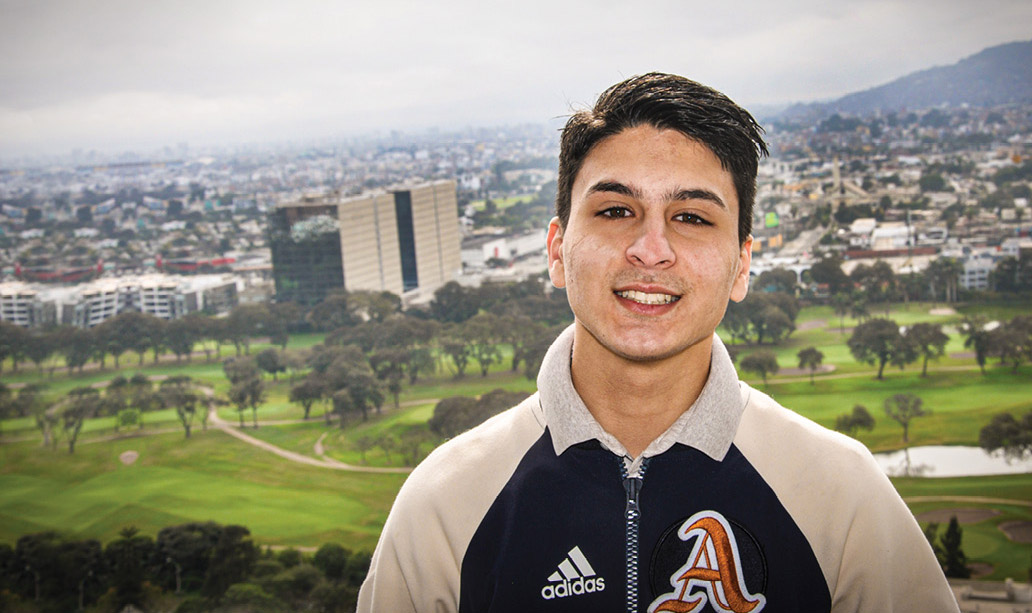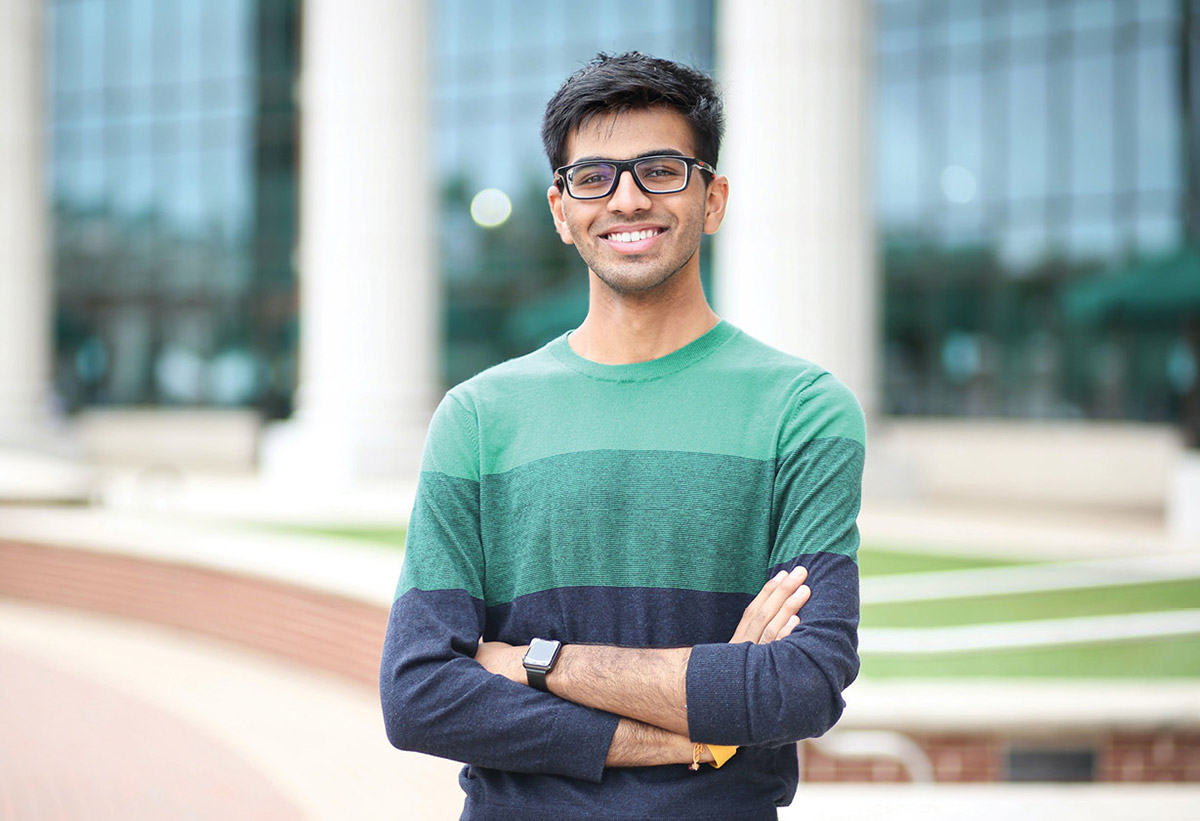New Beginnings
After nearly five months with a campus absent of students, incoming first year standouts bring a renewed sense of energy and purpose to the fall semester.
Students from 49 states and 39 countries were excited to begin their college journeys this fall at Baylor University. Here is a look at some of this year’s brightest lights who bring an array of talent to an exceptional incoming class, including a non-traditional first-year student.
Round Rock High School graduate Amanda Niño was not supposed to attend Baylor. Until the past year, she always assumed she would attend the University of Texas at Austin — her father’s alma mater. However, being an artist, she is not afraid to swim against the stream.
“The more I looked into my major and toured the campuses, it was an easy decision,” Niño says. “I felt more at home at Baylor than in the center of Austin.”
Niño comes from a UT family; her brother is a sophomore at the university. Nonetheless, her family fully supports of her college choice.
“It was a shock to all of us, but a good one,” Niño says. “Baylor was always an option, but it wasn’t my first option until I visited the campus. I could imagine myself there, and I felt really welcomed by all the students and counselors I met. The campus tour really sealed the deal for me.”
Baylor’s community of faith was also a significant draw for Niño, who will minor in studio arts. She aspires to be an art therapist, working with children who have experienced trauma or who have specific disabilities.
“I want to use art to help these students express their emotions in ways words can’t,” Niño says. “I want to help them cope with whatever difficulties they may be facing.”
Art has been dear to Niño’s heart since a young age. In February, she competed in Division 4 of the Region 13 Visual Art Scholastic Event, sponsored by the Texas Art Education Association. Niño was one of five scholarship recipients through the Round Rock Art Education Association’s 5x5 Art Competition.
Niño realized her career path in an Advanced Placement psychology class during her junior year.
“That class opened by eyes to how expansive the mind is, and it led me to considering how I could incorporate art into psychology,” she says.
Baylor’s proximity to Round Rock also attracted Niño.
“It’s close to home, but I still have a sense of independence,” she says. “I’m excited to be a part of Baylor’s traditions. There is a lot of pride that comes with being a Baylor Bear.”
Niño was a National Honor Society, Spanish Honor Society, Arts Honor Society and Mu Alpha Theta (math honors) member in high school. She also participated in Zoi, a community-service club for girls, through which she served dinner to veterans on the first Friday of each month.
Additionally, Niño was one of 30 students from her high school selected to participate in the Chick-fil-A Leader Academy, a national leadership program focused on impact through action. The program equips high school students with leadership tools and exposes them to insights about community service.
Niño’s community service project through the Chick-fil-A Leader Academy was an event for children at Dell Diamond — home of the Houston Astros Triple-A affiliate Round Rock Express. The event was aimed at educating children of the benefits of being more physically active. Like so many things last spring, the event was cancelled due to the coronavirus pandemic. However, Niño remained upbeat.
“Everything that has happened since the start of the pandemic has pushed me to think about things more positively,” Niño says. “It made me lean more into my faith and my relationship with God. I’ve definitely grown as a person.”
Saying Nick Madincea is not a typical college student is an understatement of the highest order. Consider: The first time he set foot in a college classroom, he was the teacher — at Massachusetts Institute of Technology.
Madincea graduated from The Woodlands Preparatory School in 2016 and founded Drone Parks Worldwide® immediately thereafter. Unbeknownst to most, Madincea spent much of his senior year preparing to start the business.
Through Drone Parks Worldwide, Madincea offers ordinary people the opportunity to overcome the two most significant barriers to non-commercial drone flight: expense and where to fly. The business was beta-tested in 2018 at southeast Houston’s Lone Star Flight Museum.
“Think Topgolf for drones — indoor stadiums where anyone can learn how to fly,” he says. “Our mission is to enable people to fly drones without having to worry about drone laws, repairs and excessive expenses.”
His efforts led to a June 2019 feature in the Houston Chronicle that referred to Madincea as one of the leading voices in the drone industry. The Chronicle was not the first to recognize his acumen. Only a few months removed from high school, Madincea met an MIT professor at a drone-flight instruction event.
“We started talking, and I said, ‘If you ever want to do a class on drone racing, here’s my card,’” Madincea says. “I didn’t really understand at the time what I was getting myself into, but it worked out for the better.”
Doing something at an unusually young age is nothing new for Madincea, who grew up in a Formula 1 family. His first airplane flight class was at age 12, and he was immediately enamored. Flying provided a healthy escape for Madincea, who was dealing with difficult family circumstances.
“The first time I flew an airplane — lifting off and leaving all my problems on the ground — was one of the most magical experiences I’ve ever felt,” he says.
Madincea now has more than 60 flight hours under his belt, and he expects to conduct his first solo flight by year’s end.
However, learning to fly can be expensive at roughly $200 per flight hour. Drone flight, on the other hand, is much less expensive (less than $1 per hour) after the initial drone purchase.
“Also, there’s no risk of bodily harm when flying a drone,” Madincea says. “Those were the two things that caught my eye.”
Madincea has competed in roughly 10 regional drone racing competitions. He has befriended Dallas native Alex Vanover, who last year was the first rookie to win the Drone Racing League Allianz World Championship. Vanover is 20 years old.
“It’s definitely a young person’s sport,” Madincea says with a laugh. “I was in a race last December. I was flying pretty well, but I got killed by this 15-year-old kid from San Antonio.”
Now, Madincea is again surrounded by “kids.” He arrived at Baylor this fall as a 23-year-old sophomore after taking classes last year at Lone Star Community College. Although Madincea jokes that he already has a degree from “Real World University,” he knew something was missing.
“I felt limited in my personal growth by not having a college degree,” he says. “Baylor offered the best opportunity for that growth. I’m an entrepreneur in the truest sense. I love creation, and I believe there is something I can create at Baylor.”
Kayla Carmer isn’t one to let the pangs of life rain on her parade. Her vibrant personality and natural positivity radiate — immediately apparent in conversation. Therefore, when a thunderstorm doused Waco the day of her Baylor visit in June 2019, her spirits remained high.
“I had a wonderful experience,” Carmer says. “The campus was beautiful despite all the rain. I absolutely loved being at Baylor and couldn’t help thinking, ‘This is where I need to be.’”
Carmer, a graduate of Airline High School, wanted to attend college outside Louisiana and investigated numerous schools. Three months after her rain-soaked visit, Carmer made Baylor her college choice.
“I felt it would be a second home,” she says. “Baylor offers so many opportunities, and I love the diverse community. Everyone has been welcoming and has made sure that we feel loved as a part of the Baylor Family.”
Carmer is the first person in her family to attend a four-year university. And it is no small family; she has 10 siblings altogether and is the youngest of four children raised by her mother.
“She’s been my biggest role model, and she taught me to put God first,” Carmer says. “I’ve developed my faith by watching my mother. God is my strength and foundation. He’s gotten me to where I am today. I give God all the glory and credit.”
Part of what drew Carmer to Baylor was the University’s medical humanities program, which is among a small number of its kind in the country. Established in 2004, Baylor’s medical humanities challenges students to consider ethical and spiritual issues they will encounter in the medical field, to seek the essence of health and healing, and to embrace the sacred nature of a medical vocation.
Throughout high school, Carmer’s heart was set on pursing a career in nursing. However, her interest in Baylor led to a reappraisal of her specific academic path.
“I have a couple friends in the medical humanities field. After talking with them and researching the major, it was apparent that medical humanities was the best fit for me,” she says. “I didn’t want to limit myself and decided that if I’m going to be in the medical field, I might as well be in it for the long run.”
Carmer plans to attend medical school and says she is determined to become a dermatologist. She credits the TLC television show Dr. Pimple Popper featuring dermatologist Dr. Sandra Lee for kindling her interest in the field. In a broader context, though, it was Carmer’s family that fostered her decision to pursue a medical career.
“I was raised around people with medical needs, and I’ve always had a passion for helping others,” she says. “I love everything about the human body — how it functions and responds to different conditions.”
Carmer is also familiar with how the human body works in a different sense as a member of Bossier City’s Candace Dance Company. She is passionate about the arts and has trained as a vocalist and thespian.
Many similar extracurricular activities pique her interest at Baylor, including the multicultural organizations, Chamber and a ballroom dancing class. Carmer also hopes to return the favor that was bestowed upon her that rainy day last June.
“I’d really like to be a tour guide,” she says. “I got such great insight about the University and the campus from my guide. It’s a great way to connect with prospective students, and it teaches you a lot about your campus.”
Miguel Rodriguez is excited to participate in the running of the Baylor Line and all the other adventures that constitute the Baylor freshman experience. Unfortunately, he will have to wait awhile.
Due to international travel restrictions in association with the coronavirus pandemic, Rodriguez is taking his first full semester of Baylor classes online from his native Lima, Peru. He plans to be on campus for the spring semester.
Rodriguez was one of more than 600 incoming students who participated in Baylor’s Summer of Discovery, an innovative collection of course bundles in an online environment. Courses were taught by Baylor faculty in the supportive Christian environment that is a hallmark of a Baylor education.
“It was a great way for me to transition to college classes,” Rodriguez says. “I really enjoyed the approach Baylor had with students.”
Rodriguez completed a courses taught by sociology doctoral candidate Amanda Hernandez, MA ’19, PhD ’22, and mathematics senior lecturer Kathy Hutchison, BA ’75, MS ’84.
“Both of them were excellent professors,” he says. “They were always there for me. If I sent an email, they responded as fast as they could.”
It helped, Rodriguez says, that time difference was not an issue. Lima — despite being further east than Myrtle Beach, South Carolina — is in the same time zone as Waco.
“Summer of Discovery was very good for me,” he says. “It helped me better organize myself. It would have been much more difficult for me to transition to college without it.”
Rodriguez’s father earned a Master of Business Administration from the University of Dallas. While he did not live in Texas with his father, Rodriguez has traveled to America several times, most recently for his high school’s senior trip to Washington, D.C. In 2018, he visited New York City with Montessori Model United Nations.
Last year, Rodriguez was in Oregon to represent Peru at the Pan Am Grand Slam Taekwondo Championships. He has participated in the sport since age 5 and has been the top-rated competitor for his age group in Peru since 2015.
Taekwondo also provided a link to Baylor for Rodriguez. He and Baylor sophomore Ariana Vera, a Lima native, have known each other through taekwondo for several years.
“She told me a lot about the University and how magnificent it is,” Rodriguez says. “I’ve also been able to connect with people through Baylor’s Latino student group.”
Rodriguez graduated from Colegio Alpamayo, a Christian school in Lima, and he valued the familiar faith-based environment found in Baylor. However, what most drew him to Baylor was academic opportunity.
“I want to do biomedical research,” Rodriguez says. “The way Baylor involves undergraduate students in research and the University’s efforts to achieve R1 status were the main factors for my choice.”
Rodriguez envisions a career in cancer research, inspired by the way in which the disease has affected his extended family. For example, his grandparents died by the time he was 10 years old.
He also hopes to see the pandemic subside soon. Rodriguez is ready to attend Baylor in person.
“I can’t wait to see all of the structures and buildings on campus,” he says. “I’m also looking forward to being in the classes. I’ve seen videos of classes, and they are so small that you can be familiar with each other. That is very good for me.”
When Trinidad and Tobago native Sai Sagireddy arrived in Waco, he found the need to secure his own healthcare. In the process, he wondered how low-income families and the homeless can possibly afford it.
“I was surprised at the cost,” Sagireddy says. “I was left wondering, ‘What are the resources available to low-income families?’ These questions are so important, especially considering the pandemic.”
Sagireddy isn’t simply asking the questions, he’s looking for answers. A mentor encouraged Sagireddy to make a difference in Waco.
“I entered 10 weeks of scrupulous research, calls, emailing and outreach to understand the U.S. healthcare system and how it affects Waco residents.”
What Sagireddy found is that 29 percent of the Waco population lives below the Federal Poverty Level, commonly known as the poverty line. This led him to create the Waco Low-Income Healthcare Resources Guide, which lists more than 90 medical institutions and 15 healthcare programs that cater to low-income families and disadvantaged individuals within the Waco area.
“It’s designed to be a vital tool for homeless and needy populations and organizations focused on serving those groups,” Sagireddy says. “It helps homeless shelter directors inform individuals about healthcare options, student organizations and nonprofit groups focused on service, and health groups in the Waco area and beyond.”
Others have helped along the way. Sagireddy has partnered with Prosper Waco, Mission Waco, Baylor’s Office of External Affairs and the Baylor Academy for Leadership Development.
“Baylor faculty and staff have been instrumental in acquiring contacts, and my classmates have helped tremendously, as well,” he says. “The team grows daily, and I’m so glad people see the need and want to serve.”
Heart for the Homeless President Ethan Lowder was also instrumental in Sagireddy’s quest. Heart for the Homeless, an undergraduate student group at Washington University in St. Louis, aims to improve the health of the St. Louis homeless community through medical education and connection to primary care.
“I was able to use his expertise as a framework for this project, and he mentored me through the process,” Sagireddy says.
The Waco Low-Income Healthcare Resources Guide will be distributed in various ways. Prosper Waco will integrate the guide’s database into the Waco RoundTable, and a digital version of the guide will be distributed to organizations throughout the Waco community.
“We also plan to provide the guide at The Store on Baylor’s campus for high-need students,” Sagireddy says.
Such endeavors are nothing new for Sagireddy, who has written three exam preparation guides available on Amazon. He is founder and president of the International Obesity Network, a registered nonprofit that raises obesity awareness, prevention and treatment. Started in 2016, the network has more than 200 members.
Sagireddy attended Presentation College Chaguanas in Trinidad and Tobago. He was involved in sundry student organizations, including Youth for Christ and the debate, astronomy, robotics, photography and environmental clubs.
At Baylor, Sagireddy is a University Scholar on a premed track with concentrations in biology, biochemistry and medical humanities. He plans to be part of a medical scientist training program and earn a master’s degree in public health.
“My goal is to do my part in advancing science to create new treatment plans for various diseases in medicine,” Sagireddy says. “I also want to work directly to treat patients and make healthcare accessible for everyone.”
